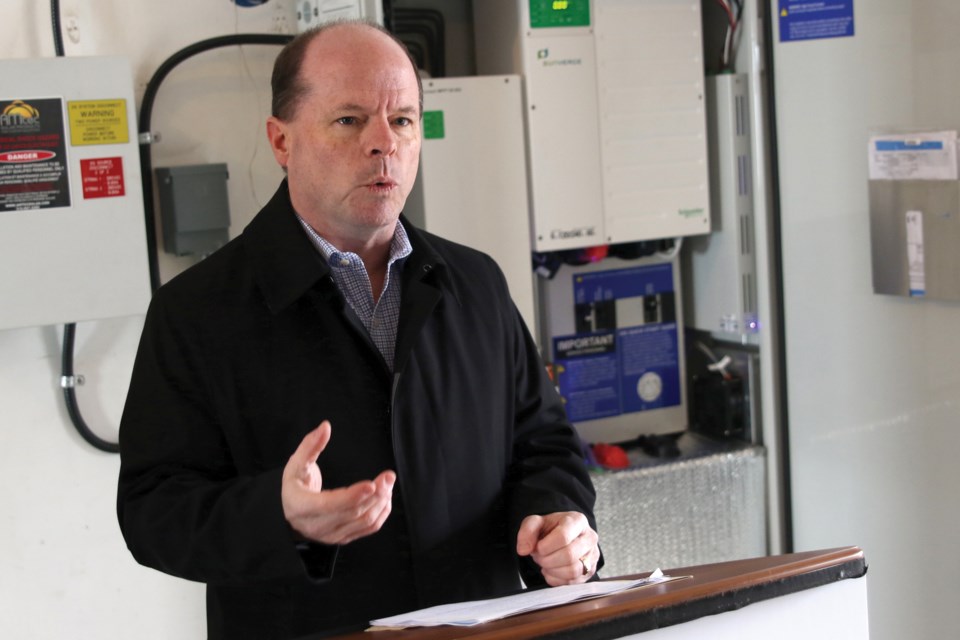THUNDER BAY – The City of Thunder Bay will receive over $660,000 in dividends from its majority ownership of Synergy North, after the company presented its 2020 annual report to city council on Monday.
Synergy North board chair Gary Armstrong said the utility, owned jointly by the municipalities of Thunder Bay and Kenora after a 2019 merger, had weathered the pandemic more smoothly than anticipated last year.
It wasn't all good news, however, with the Mapleward Generating Station continuing to lag performance projections, and requiring a $1 million cash injection.
The Thunder Bay Hydro Corporation, owned 100 per cent by the city and holding a more than 90 per cent share in Synergy North, finished 2020 with a comprehensive income of $3.6 million, Armstrong reported.
That was knocked down only slightly by an estimated COVID-19 impact of $507,000, with more than half of that figure attributed to the deferral of planned rate increases and waiving of late penalties in the spring and summer.
Those results are a far cry from initial estimates of a $1.2 million COVID-19 hit, let alone a worst-case scenario envisioned early in the pandemic, when leaders worried about the prospect of widespread defaults on utility bills.
Even 10 per cent of Synergy North customers defaulting on bills could have risked a cascading effect leading to the company’s insolvency, Armstrong told city councillors.
The utility hedged against that possibility, reducing expenses by $1.3 million last year through “early, proactive steps” like increasing its line of credit, deferring capital investment, and holding off on filling some staff vacancies.
“Really, it wasn’t as bad a year as we were worrying it could have been,” Armstrong said. “Looking back, I would say there was no significant increase in customer defaults, either commercial or residential.”
The company will catch up on deferred capital investments starting with $400,000 in 2021, said CEO Robert Mace, who is set to retire later this month.
The $661,200.46 in dividends issued to the City of Thunder Bay by Synergy North this year includes a special merger efficiency dividend of around $460,000, as well as $200,000 in returns from a joint photo-voltaic solar project.
The company had fully recouped the more than $1 million it spent on the merger (costs such as legal fees and rebranding) through efficiencies by the second quarter of 2020, a span of little more than a year.
“[That’s] clearly good news and tangible proof, in my mind, that the merger has absolutely been a success,” said Armstrong.
Merger efficiency dividends will be issued to the two municipal governments through 2023, after which the savings will be applied to reduce customers’ rates.
The dividend is split along ownership lines, with the City of Thunder Bay receiving 91.69 per cent, and the City of Kenora 8.31 per cent.
Mace said he was confident the company will hit pre-merger estimates of $900,000 in annual efficiencies from combined operations going forward.
The Thunder Bay Hydro Corporation reported less promising news elsewhere on the renewable energy front.
The Mapleward Renewable Generating Station, which is owned and operates through a holding company, required an injection of $1 million in 2020 to keep it solvent.
The station lost $807,000 last year, though Mace noted $653,000 of that was to cover a writing down of the value of the asset, rather than actual operating losses.
The facility, which generates energy from methane gas collected from the municipal landfill, has been plagued with declining gas supply for years.
Production has declined steadily from a peak of over 2 million KwH per month, reached in 2012, to well under 1 million today.
Company leaders said that slide was showing tentative signs of stopping in 2021, with a slight increase in the first quarter.
However, the city’s plan to create an organics diversion program is expected to reduce the effectiveness of the generating station.
That makes it hard to say whether the generating station will ultimately prove to be financially viable, according to Mace, who said the impact of a composting program is still uncertain.
In its photo-voltaic solar power projects, on the other hand, the company is consistently outperforming initial business plans, generating enough electricity to power roughly 100 homes, with $219,000 of activity in 2020.
Questioned by councillors about the potential to build on that success, Mace said changes in policy under the Ford government had changed the calculus on renewable energy projects.
“Renewables seems to be off the table under this provincial government,” he said. “You just can’t put a business case together in the current political climate.”





